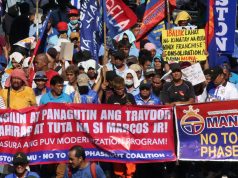MANILA – The Land Transportation Franchising and Regulatory Board (LTFRB) has decided to allow the continued operation of transport network companies Uber Philippines and GRAB, but slapped a P5-million fine on each for repeated violations incurred since the government allowed their operation two years ago.
Among the violations, cited in a marathon hearing by the regulator Tuesday (July 11), were the absence of proper screening procedures for drivers; transfer of accreditation from one applicant to another; and allowing those without provisional authorities or certificates of public convenience to go online.
GRAB admitted that of the 28,000 registered partners, only 4,000 have provisional authorities or certificates of public convenience.
Uber, on the hand, has more than 10,000 partners but only has more than 600 drivers with proper documentation.
If the memorandum circular governing TNCs were followed, accreditation for the two companies should have been cancelled altogether, LTFRB said.
However, the agency also took into consideration the riding public’s need for such mode of transportation.
Next week, the LTFRB will form a technical working group involving GRAB and Uber officials to determine how many franchises should be released to the two companies.
Atty. Aileen Lizada, LTFRB board member, said, “we will be lifting and coming up with a number that is acceptable both to LTFRB and to GRAB and Uber, considering also the traffic condition that we have. It will be a balance of their needs, the riding public’s needs, as well as the number that we believe would be appropriate for TNCs to survive and that will address the need of the riding public.”
According to LTFRB chairman Atty. Martin Delgra III, “the board is mindful of the fact that the violation of the terms and conditions of the terms of accreditation would actually merit cancellation of the accreditation of the TNCs. The overriding interest of the riding public constrains the board not to impose this very serious imposition of cancellation.”
Click and watch this video report below:










